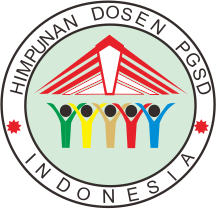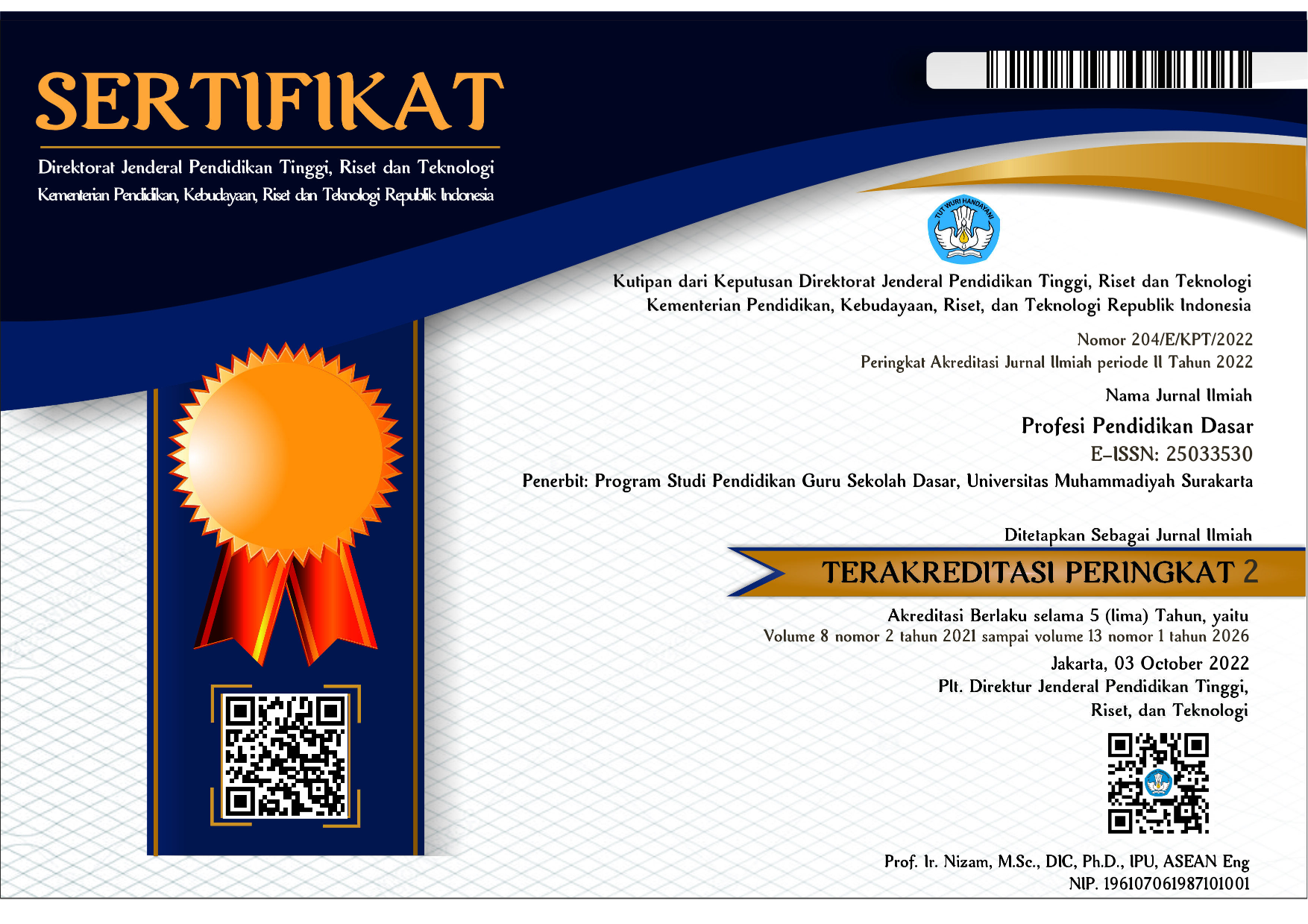Analysis of Factors Affecting Primary Teachers' Happiness
Binsar Samosir(1), Darsih Idayani(2*)(1) Universitas Terbuka, South Tangerang
(2) Universitas Terbuka, South Tangerang
(*) Corresponding Author
Abstract
Keywords
Full Text:
PDFReferences
Ahmad, A., & Nurhidaya, N. (2020). Media Sosial dan Tantangan Masa Depan Generasi Milenial [Social Media and Millennial Generation Future Challenges]. Avant Garde: Jurnal Ilmu Komunikasi, 8(2), 134–148. https://doi.org/10.36080/ag.v8i2.1158
Ahmed, N. E., Hushin, H., & Mahayadin, M. (2020). Workplace Happiness and the Relationship to the Work Motivation among PKebahagiaan di Tempat Kerja dan Hubungannya terhadap Motivasi Kerja Guru Sekolah Rendah di Daerah Pasir Gudang. Sains Humanika, 12(2), 35–39. https://doi.org/10.11113/sh.v12n2-2.1782
Ardhyantama, V., & Idayani, D. (2020). Two-way Communication in Distance Learning. Proceedings of International Conference on The Future of Education IConFEd), 404–410. Penang, Malaysia: Institute of Teacher Education Tuanku Bainun Campus. Retrieved from http://ipgktb.edu.my/iconfed2020/e_proceedings/bi/theme_e/FP068_E_TWO-WAY%20COMMUNICATION%20IN%20DISTANCE%20LEARNING.pdf
Benevene, P., de Stasio, S., Fiorilli, C., Buonomo, I., Ragni, B., Briegas, J. J. M., & Barni, D. (2019). Effect of Teachers’ Happiness on Teachers’ Health. The Mediating Role of Happiness at Work. Frontiers in Psychology, 10. https://doi.org/10.3389/fpsyg.2019.02449
Bhatia, A., & Mohsin, F. (2020). Determinants of College Teachers’ Happiness-A Comprehensive Review. Journal of Critical Reviews, 7(9), 9–17. https://doi.org/10.31838/jcr.07.09.02
de Stasio, S., Fiorilli, C., Benevene, P., Boldrini, F., Ragni, B., Pepe, A., & Briegas, J. J. M. (2019). Subjective Happiness and Compassion Are Enough to Increase Teachers’ Work Engagement? Frontiers in Psychology, 10. https://doi.org/10.3389/fpsyg.2019.02268
de Stercke, J., Goyette, N., & Robertson, J. E. (2015). Happiness in The Classroom: Strategies for Teacher Retention and Development. Prospects, 45(4), 421–427. https://doi.org/10.1007/S11125-015-9372-Z
Field, A. (2018). Discovering Statistics Using IBM SPSS Statistics (5th ed.). London: Sage Publications Ltd.
İhtiyaroğlu, N. (2018). Analyzing the Relationship between Happiness, Teachers’ Level of Satisfaction with Life and Classroom Management Profiles. Universal Journal of Educational Research, 6(10), 2227–2237. https://doi.org/10.13189/ujer.2018.061021
Jalali, Z., & Heidari, A. (2016). The Relationship between Happiness, Subjective Well-Being, Creativity and Job Performance of Primary School Teachers in Ramhormoz City. International Education Studies, 9(6), 45–52. https://doi.org/10.5539/ies.v9n6p45
Kim, J. S., & Kim, S. L. (2020). The Effects of Early Childhood Teachers’ Happiness and Psychological Burnout on Their Teacher-Child Interactions. The Journal of the Convergence on Culture Technology (JCCT), 6(2), 123–130. https://doi.org/10.17703/JCCT.2020.6.2.123
Kun, A., & Gadanecz, P. (2022). Workplace Happiness, Well-being and Their Relationship with Psychological Capital: A study of Hungarian Teachers. Current Psychology, 41(1), 185–199. https://doi.org/10.1007/s12144-019-00550-0
Mertoğlu, M. (2018). Happiness Level of Teachers and Analyzing its Relation with Some Variables. Asian Journal of Education and Training, 4(4), 396–402. https://doi.org/10.20448/journal.522.2018.44.396.402
Moskowitz, S., & Dewaele, J. M. (2021). Is Teacher Happiness Contagious? A Study of The Link Between Perceptions of Language Teacher Happiness and Student Attitudes. Innovation in Language Learning and Teaching, 15(2), 117–130. https://doi.org/10.1080/17501229.2019.1707205
Nurochim, & Ngaisah, S. (2019). Kebahagiaan di Tempat Kerja: Kajian Teoretik Upaya Peningkatan Mutu Guru [Happiness in Workplace: Theoretical Study of Efforts to Improve Teacher Quality]. Prosiding Simposium Pendidikan Majelis Nasional Korps Alumni Himpunan Mahasiswa Islam (MN KAHMI) 2019: Teknologi, Industri Dan Pendidikan, 93–100. Surakarta: UNS Press. Retrieved from https://repository.uinjkt.ac.id/dspace/bitstream/123456789/56365/1/Kebahagiaan%20di%20Tempat%20Kerja_Nur_compressed.pdf
Prasetyo, A. R. (2015). Gambaran Career Happiness Plan pada Dosen [Overview of Career Happiness Plan for Lecturer]. Jurnal Psikologi Undip, 14(2), 174–182. https://doi.org/10.14710/jpu.14.2.174-182
Seligman, M. E. P. (2017). Authentic Happiness: Using The New Positive Psychology to Realize Your Potential for Lasting Fulfilment (Paperback edition). Boston: Nicholas Brealey Publishing.
Sugiyono. (2012). Metode Penelitian Bisnis [Bussiness Research Methodology]. Bandung: Alfabeta.
Sugiyono. (2017). Statistika untuk Penelitian [Statistics for Research]. Bandung: Alfabeta.
Sugiyono. (2018). Metode Penelitian Kuantitatif [Quantitative Research Methods]. Bandung: Alfabeta.
Tadić, M., Bakker, A. B., & Oerlemans, W. G. M. (2013). Work Happiness Among Teachers: A Day Reconstruction Study on The Role of Self-concordance. Journal of School Psychology, 51(6), 735–750. https://doi.org/10.1016/j.jsp.2013.07.002
Toulabi, Z., Raoufi, M., & Allahpourashraf, Y. (2013). The Relationship Between Teachers’ Happiness and Quality of Working Life. Procedia - Social and Behavioral Sciences, 84, 691–695. https://doi.org/10.1016/j.sbspro.2013.06.628
Wulandari, S., & Widyastuti, A. (2014). Faktor-faktor Kebahagiaan di Tempat Kerja [Happiness Factors in Workplace]. Jurnal Psikologi, 10(1), 49–60. https://doi.org/10.24014/jp.v10i1.1178
Zhongying, H. U. (2013). Research and Analysis on the Teachers’ Happiness. Journal of Applied Sciences, Engineering and Technology, 6(10), 1720–1725. https://doi.org/10.19026/rjaset.6.3894
Zis, S. F., Effendi, N., & Roem, E. R. (2021). Perubahan Perilaku Komunikasi Generasi Milenial dan Generasi Z di Era Digital [Changes in Communication Behavior of Millennials and Z Generations in Digital Era]. Satwika: Kajian Ilmu Budaya Dan Perubahan Sosial, 5(1), 69–87. https://doi.org/10.22219/satwika.v5i1.15550
Article Metrics
Abstract view(s): 477 time(s)PDF: 407 time(s)
Refbacks
- There are currently no refbacks.


















